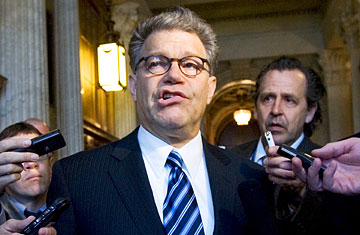
Minnesota Democratic Senate candidate Al Franken talks to reporters in Washington on Nov. 19, 2008
By Dec. 5, all 2.9 million votes cast in the 2008 Minnesota Senate campaign will have been reviewed by hand, a month after challenger Al Franken and incumbent Norm Coleman were separated by just a few hundred votes on Election Day. Franken maintains he's currently in the lead by 20 or so votes, while Coleman says he's ahead by thousands. The reason for the discrepancy: "challenged" ballots, which representatives from both campaigns say need further examination. The two candidates are slicing, dicing and dividing this bulky stack of votes differently so each can claim to be pulling ahead. After the Dec. 5 recount deadline, an independent state board will examine the challenged ballots.
Most political experts expect the Minnesota election to be decided in the courts or even in the state senate. In short, it's a mess. But it's not that unusual. A look back at some similarly close — and even closer — races provides some lessons on where things might go in the Minnesota contest, the only remaining undecided 2008 Senate race. (Republican Saxby Chambliss thumped Democratic challenger Jim Martin in a Dec. 2 runoff.)
The closest Senate race in history — for an open New Hampshire seat in 1974 — was so tight that the candidates had to hold a second election. After Republican Louis Wyman beat Democrat John Durkin by just 355 votes, a recount gave Durkin the lead — but by only 10 votes, which meant another recount. This count gave the election back to Wyman — by two votes. Durkin asked the Senate — which had a convenient 60-vote Democratic majority — for a review of the results. Despite six weeks of debate, the Senate couldn't resolve the matter, and the two candidates agreed to run all over again. With record turnout, Durkin won by some 27,000 votes — showing how recounts can and do overturn election results.
As for Minnesota history, one notable recount case stands above all others. In the state's 1962 gubernatorial race, incumbent Elmer L. Andersen lost by a narrow margin of less than 200 votes to challenger Karl Rolvaag (out of 1.26 million votes cast). Andersen asked for a recount, which required some 100 teams of ballot reviewers to fan out across the state. The recount took 139 days, and the final tally gave the election to Rolvaag by 91 votes, but not before Andersen had already been sworn in as governor — albeit provisionally. Fortunately for Rolvaag, and for the state, Andersen let his opponent in on official business during the recount waiting period so when Rolvaag took over the reins in March 1963, the transition was smooth and drama-free.
We can only hope Coleman and Franken take a page from that more gentlemanly era, but it's not likely. The campaign was hard fought, bordering on nasty, with loads of negative advertising on both sides. Coleman sued Franken during the campaign for defamation — the case was thrown out of court — and the two teams have already been battling before judges over recount issues. Which brings to mind the most dramatic and important recount in American history.
Ah, yes, the 2000 Florida hanging-chad, butterfly-ballot, television-network-confusing fiasco. The presidential race between Al Gore and George W. Bush was eventually decided by the Supreme Court, which voted 5-4 to suspend recount activity, a decision that ultimately awarded the state and its Electoral College votes to our 43rd President. There were machine counting, hand counting, ballot inspections, dispute over absentee votes, a powerful Florida secretary of state named Katherine Harris and enough hand-wringing that the transition between Bill Clinton and Bush was delayed by six weeks.
If parties and politicians learned one thing from 2000, it's that they ought to be ready for recounts. To that end, it's typical for candidates to send advance teams of lawyers to precincts and states where the vote is expected to be close. The idea is that the legal groundwork for a recount and the financing of it can be laid down ahead of time. John Kerry and Bush had well-staffed legal teams in place in Ohio, Florida and other states before the 2004 presidential election for this very reason. Often, recounts are triggered automatically by extremely close margins, as in the Minnesota race; in some states, a candidate can request a recount, finance it and be reimbursed with public funds if the recount reverses the vote. (Recounts do not come cheap: one of the most famous in recent history, for Washington governor in 2004, cost the state Democratic Party $730,000. When the recount gave the election to Democrat Christine Gregoire, the initial loser, the state paid the party back. The final margin: 133 votes out of more than 2.8 million cast.)
It's impossible to say how or when the Franken-Coleman contest will be decided. All that Minnesotans — and the next class of U.S. Senators — can do is wait. Anyone looking for early clarity is bound to come up empty. Case in point, this blog-post headline currently on Coleman's campaign-website homepage:
COLEMAN CAMPAIGN: WE LEAD BY 2,200 VOTES!***
***(Okay, Maybe Not, but Al Franken Does Not Hold a Lead in the Recount)
Thanks for sorting that out, guys.
